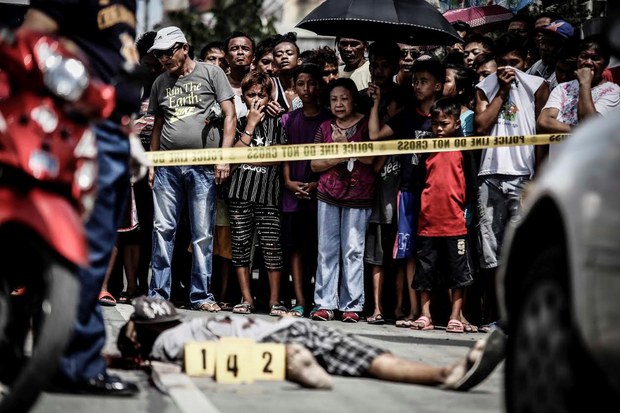6 Anti-Drug Operatives Killed in Volatile Southern Philippines
2018.10.05
Cagayan de Oro, Philippines
 The body of Eric Estrada, an alleged drug pusher, lies along a busy street in the northern Philippine city of Dagupan after police said that motorcycle-riding gunmen shot hit six times before fleeing, Oct. 6, 2016.
The body of Eric Estrada, an alleged drug pusher, lies along a busy street in the northern Philippine city of Dagupan after police said that motorcycle-riding gunmen shot hit six times before fleeing, Oct. 6, 2016.
Five anti-drug agents and a policeman were killed in an ambush in the southern Philippines on Friday, a week after the government warned that the country risked becoming a “narco-state” had President Rodrigo Duterte not launched his war on narcotics, officials said.
Two other officers were wounded in the attack, when unidentified gunmen waylaid their vehicle as they travelled near Marawi city, according to a police report obtained by BenarNews.
The group had just attended a program for drug surrenders in the nearby town of Tagoloan when they were attacked.
Pursuit operations were ongoing and the casualties were brought to Marawi’s Amai Pakpak Medical Center, according to the report.
The identities of the attackers were not yet known, but the area where the ambush took place is a known hotbed of criminal groups and Islamic State-linked militants.
Duterte had himself accused Filipino IS militants, led by the Maute brothers of Marawi, of being drug protectors. That was part of his reason for attacking the areas they controlled near Marawi months before they linked up with Isnilon Hapilon’s faction and sacked the city.
Hapilon, a long-time militant from the Abu Sayyaf organization, had emerged as the overall leader of IS in the Philippines. He and the Mautes led hundreds of fighters from Southeast Asia and the Middle East in taking over Marawi, the country’s only predominantly Muslim city, which authorities said had also become a haven for illegal activities, including drug trafficking.
The siege lasted five months until October 2017, when Hapilon and the Mautes were killed by Philippine government troops. The whole of the southern Mindanao region, however, remained under tight military rule, amid reports that stragglers from Marawi were trying to regroup.
According to International Alert Philippines, which tracks violence in the south, conflicts attributed to the illegal drug trade fell by 15 percent last year – during the height of the Marawi conflict – but persists as a worrisome trend.
“The ability of violent extremists to mount armed offensives over several months and their capacity to evade capture or death point to their access to funds from many sources, including shadow economies, such as illicit drugs and weapons in the country as well as abroad,” the group said.







